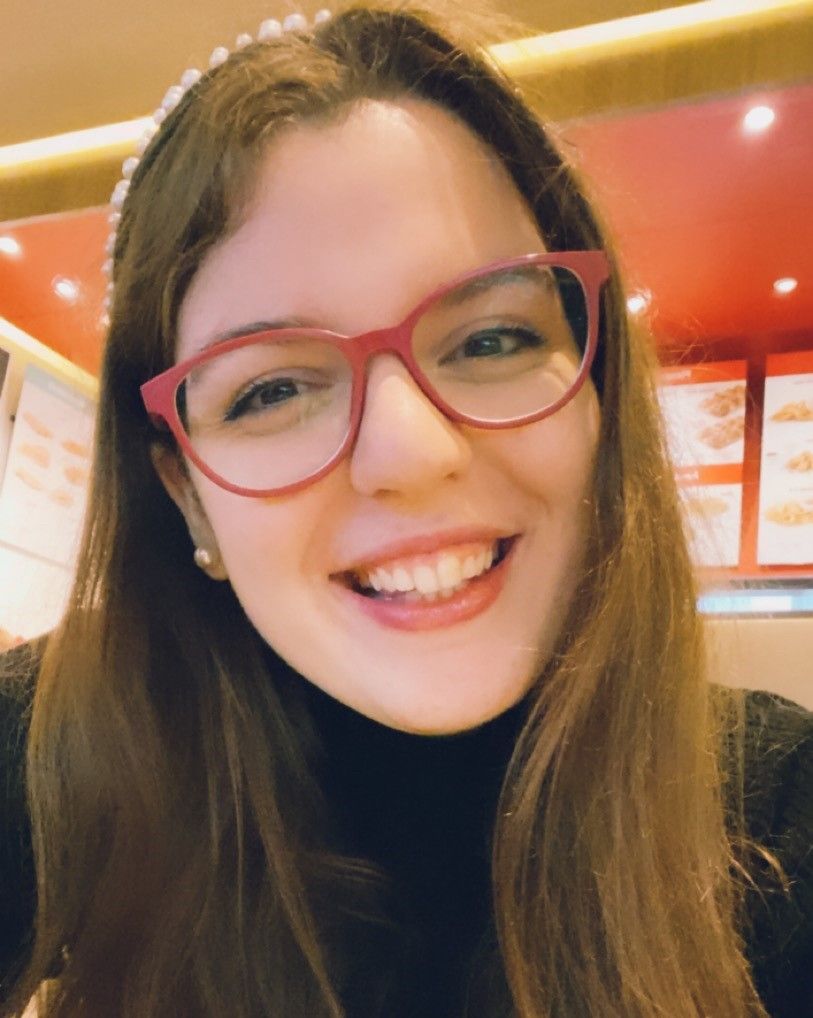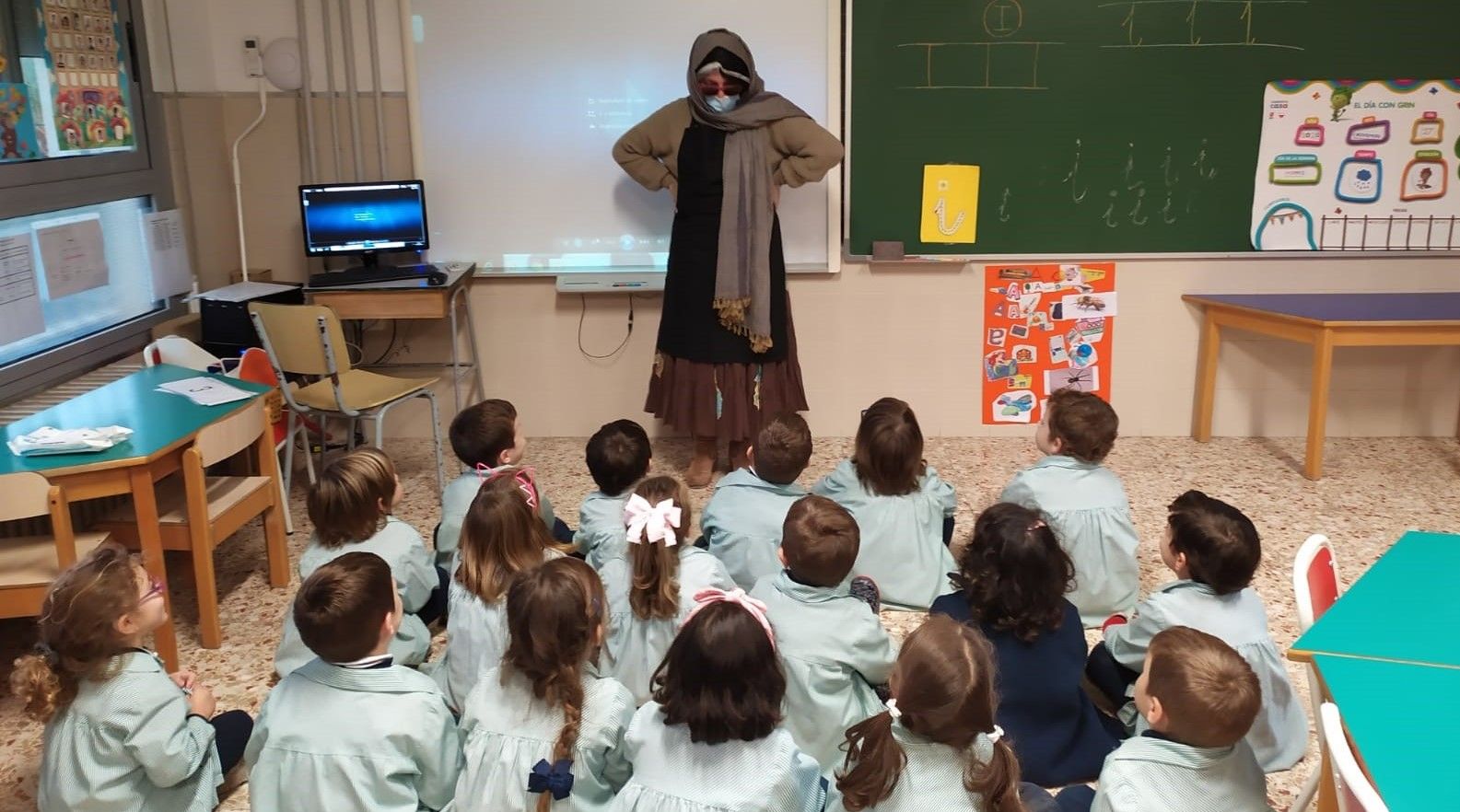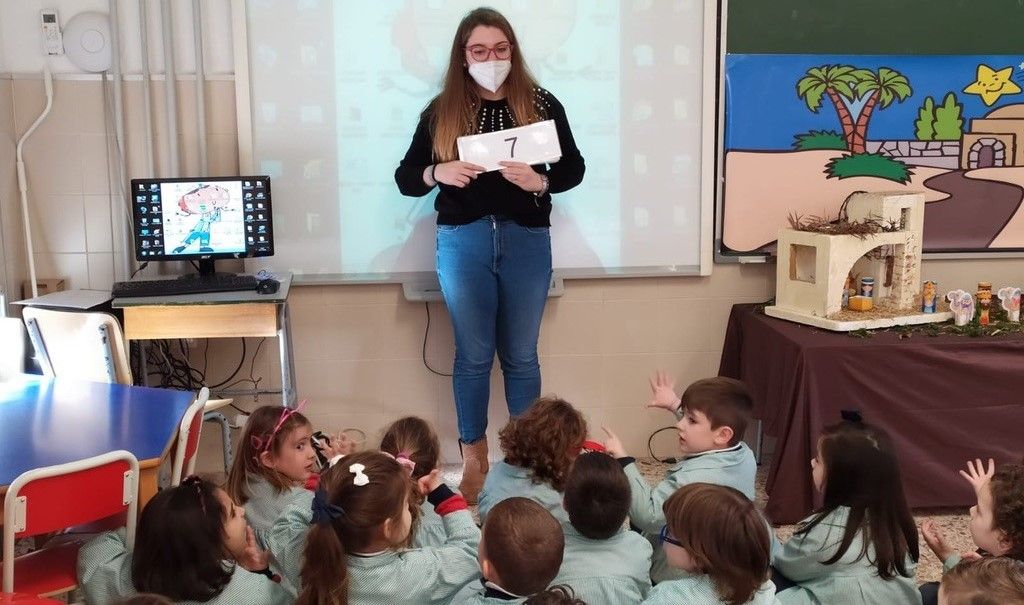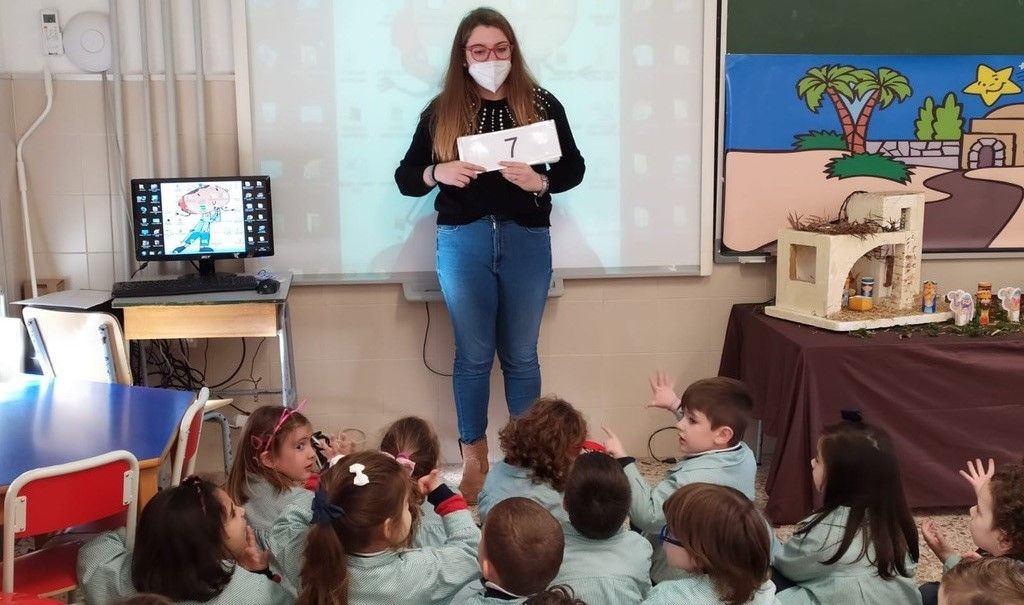- María José Pérez Esteve, an Early Years Education student, has told us all about her experience on placement at a school in Elche, teaching three- and four-year-olds.
- Over the last few months, she’s learnt that teachers are more than just a guide or a learning facilitator for children. “They are their role-models.”
María José Pérez Esteve, a student on the dual degree in Early Years Education and Primary Education at CEU UCH in Elche spent four months on her first placement at a school in the town. Her vocation: to teach young children. So much so that she even opted to extend her placement, even during the exam period for her degree – in the end, she’s done two months more voluntarily. “I’d do it again and again,” she says – she also devotes time to volunteering to work with young people at Cáritas, as part of a programme of revision classes for children. Like many students studying education degrees, she still wonders what it is that makes her want to be a teacher.

What was your placement like at the Jesuitinas school?
I can sum it up with the phrase: the best experience of my life. Maybe that sounds clichéd, but it’s the truth. Personally, I’d never had the experience of being able to enter, every day, a world which is totally different from the one I normally inhabit and I realized that it was much purer, more magical, fun, pleasant and sincere than elsewhere. So, I really feel very lucky to have had and enjoyed that experience.
It might sound self-centred, but you go into that world not as a mere visitor, but as “Miss”, the teacher. And that opens a door to a world in which you really live like a queen. Most of the time, the words you hear and the interactions you have with the children are filled with affection, admiration and so much love.
I’d say, as a university student, that there are bound to be times when you’re unsure of yourself. Because all the theory, routine, assignments, deadlines, online lectures, the daily grind – it can get you down sometimes. A lot of the time it makes you stop and question yourself and it can give you a more negative vision of the profession.
What do you mean?
Although I’m very happy at university here at CEU, I have to say that there’ve been times when I’ve wondered whether I’d chosen the right degree. But right now, after being on placement for five months (it’s flown by), I can really feel it in my heart that I was born to teach children.
Committed to volunteering
We’ve heard that you did an extra voluntary placement.
CEU offers students four months’ practical training in schools, compared with only two months for those at the University of Alicante. And then you can also do a voluntary placement once you finish. I decided to do that in January and the beginning of February, even though that was when the exams were. It wasn’t hard. Quite the opposite – going to school was a way of switching off from studying and that made it easier to get back to it later.
I’d do it again and again. My aunt says that, if it was up to me, I’d stop doing my degree and just do voluntary placements without pay for the rest of my life. That made me laugh, but maybe there’s some truth in it.
What did you have to do during this period?
The main thing to do was to learn, to soak up like a sponge all the practical experience that a placement gives you. People think that we’re just there to support the teacher who’s already there, but that’s not really the case. We’re trainees, we’re learning, so in fact the class teachers have double the normal work.
It’s up to us to learn as much as possible and make what they have to do for us, the trainees, easier. And once you’ve taken in and understood how the school, the class, and the teacher work, then you can be much more effective in the classroom.
Was this your first experience of a placement or had you done it before?
This was my formal placement experience. I had interacted with children of different ages when I did some volunteering for Cáritas, which has an agreement with the University. That was very different, because you’re dealing with vulnerable children and you’re given a role which is more like that of a one-to-one teacher than a schoolteacher. But I learnt a lot from that experience too and it help me to grow as a person.

Education for educators
How have the things you’ve learnt as part of the degree helped you?
In terms of professional and personal development, they’ve helped me. Because I’ve noticed that I’ve become more mature, more committed and more inquisitive, in a way that I wasn’t before, or perhaps I hadn’t found a way of expressing it. However, in terms of knowledge for practical purposes, I must say that I think there are areas for improvement in terms of the way the degree is structured.
For example, there are some key areas that need addressing such as the provision of first aid, when dealing with epileptic fits, or other diseases. And also how to react in those situations, and how to speak to and deal with parents, what you should and shouldn’t say – these are things that either aren’t covered or are covered only briefly.
What aspects would you highlight about the training primary school teachers receive?
I’d highlight the fact that there’s an urgent need to restructure the curriculum, and also the manner of selection of students and lecturers. It’s clear that the teacher’s role is extremely important for society as a whole and so you can’t just admit just anyone – what you put in is what you get out. The people of the future, the people who will take us all to success or ruin, are in their hands.
Where do you want to take your career when you graduate?
Right now, I’ve got two different paths in mind, and both concern teaching. One of them concerns teaching adults and the other teaching children. I’d like to do a degree in history and maybe a doctorate, and that’d open up a whole range of academic options. However, the placement experience has opened up the other path: a desire to move into employment and get that shot of daily happiness much earlier. I don’t know what I’ll end up doing, but I know what I’m like. I’m very ambitious and maybe I can find a way of combining the two. But I’ll definitely always follow my heart.
Teaching children means being a role model
What role should someone teaching young children play in their education?
Today, it’s fashionable to say things like “the teacher must play the role of a guide and support a child’s learning. And the child must be the centre of the teaching and learning process.” But I’m not one for fashions, so I’m not going to pay attention to this one.
From my point of view, primary school teachers have a more important role to play than just to be a guide. And I say that not because I want to be the centre of attention but because of what I learnt from being a pupil.
I’ve been very lucky to have had teachers in different stages of my education who were outstanding both as people and as educators – they helped me and showed me the beauty that exists in life. That’s why I can’t see them as simply guides or facilitators of my learning. They were so much more! They are the model I aspire to and the ones who used their perspective to show me what I couldn’t see in myself. The best teachers aren’t guides, but role-models.
What is a teacher for you?
A teacher must have a certain set of values, because, in the end, their pupils learn by imitation to a large extent. Those values that you transmit are probably the ones that the child will take on board. So, their teacher needs to be honest, hard-working, cheerful, curious, affectionate, and proactive, and be a shining light for others.
What do you think could contribute as a primary school teacher?
I’d like to think that what I could contribute is the right attitude and the desire to get things moving, to grow, to learn, to do lots of projects, to make mistakes and yet also to keep moving forward.
I’ve got a lot of curiosity and I’m really inquisitive, and in education that’s something you really need. Because there are lots of qualifications out there, and there a lot of people who have them, but being qualified doesn’t equate to excellence. But when a schoolteacher has the right attitude, the determination to work hard, and a real love of what they’re doing, that can transform a whole school.
 For María José, you have to soak up like a sponge all the practical experience a placement gives you
For María José, you have to soak up like a sponge all the practical experience a placement gives you







